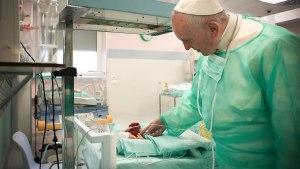Lenten Campaign 2025
This content is free of charge, as are all our articles.
Support us with a donation that is tax-deductible and enable us to continue to reach millions of readers.
“I hope that […] the debate on the essential question of the end of life can be conducted in truth,” Pope Francis told some 70 elected representatives from the south of France, whom he received at the Vatican on November 30, 2024. With the examination of the end-of-life bill, interrupted by the dissolution of the French National Assembly, due to resume next February, the Pope called for the development of palliative care.
The group of elected officials — senators, deputies, mayors, and town council members — from the Var department in the Provence-Alpes-Côte d’Azur region, was led by Bishop Dominique of the Diocese of Fréjus-Toulon.
The three-day visit to Rome, which culminated in a papal audience, was “a personal journey” for these politicians — Catholics, or Christians of other denominations — from various parties, the bishop told I.MEDIA.
Accompanying life to its natural end should be the goal
In his address to the audience, Pope Francis referred to the draft law on the end of life, due to be examined by deputies in the first half of February 2025. The dissolution of the French National Assembly last June interrupted the study of this law, which has been reintroduced by the new government with the tabling of a text in September. It provides for the institution of “assisted dying” for people suffering from serious and incurable lethal conditions.
Hoping that this debate on “the essential question of the end of life” would take place “in truth,” the head of the Catholic Church encouraged elected representatives to make their “contribution.” He called for legislation “accompanying life to its natural end through a more extensive development of palliative care.”
People at the end of life “need to be supported by assistants who are faithful to their vocation, which is that of providing assistance and relief even while not being able to cure,” he insisted.
Departing from his prepared text, the pontiff added, “Words are not always necessary, but taking a sick person by the hand […] does a great deal of good, and not only to the sick person, but to us too.”
Pope’s words welcome
According to Bishop Rey, the Pope’s mention of the bill was long overdue. “It’s one of today’s hot topics. The people [in the group] are aware of the Church’s positions,” he said.
The Pontiff wished to evoke “today’s issues, the questions we may have about the project,” added the bishop.
In his public speeches, Pope Francis has never ceased to express his opposition to “sophisticated euthanasia laws,” frequently denouncing the “rejection of the elderly” and a world that wants to “suppress” them.
“The doctor exists to heal from evil: always cure! No life is to be discarded,” he emphasized again yesterday while speaking to Italian dentists, arguing that a patient suffering from an incurable disease should be accompanied “to the very end.”
Mediterranean heritage and young people
During his audience with French elected representatives, the Pope spoke of their Mediterranean location, a region dear to the Argentine pontiff, who has made numerous trips to the shores of the ocean. He recognized it as “a crossroads where a number of influences and traditions meet, but which also gives rise to confrontations.”
As on his trip to Marseille in September 2023, Francis encouraged elected representatives to make the Mediterranean “a place where different countries and realities meet on the basis of the humanity we all share, and not of ideologies that set people against each other.”
The Pope is also expected in Corsica on December 15, for a new Mediterranean visit.
In his address, the Pope also expressed his concern for young people, insisting that “it is a mistake to think that young people do not aspire to anything other than lounging on the sofa or on social networks!” He advocated an education that involves them “in the real world, in a visit to the elderly or to disabled people, a visit to the poor or migrants.”
At the end of the meeting, as is customary, he greeted the elected representatives — some of whom were accompanied by their families — one by one, exchanging a few words with each of them.




